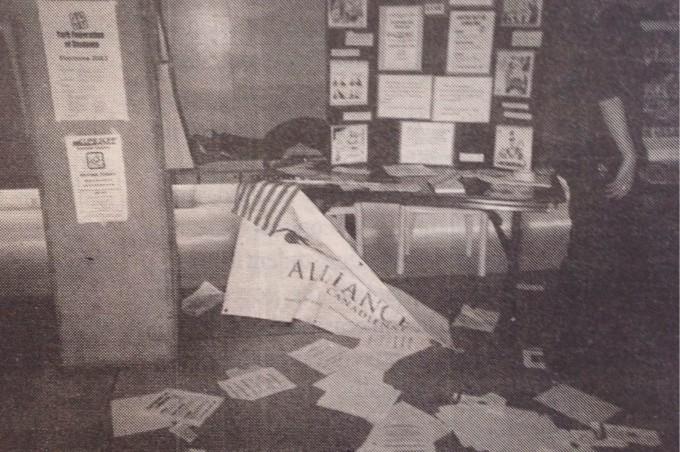By Sandie Benitah
A peaceful but spirited anti-war protest at York University was spoiled after protestors and bystanders alike couldn’t keep their emotions under control.
Several hundred protesters took over the university last week, occupying parking lots and making their way through the hallways — armed with drums and anti-war chants — into lecture halls where they encouraged students to join them.
However, the day was filled with incidents that only seemed to fuel the people’s anger rather than unite them in peace.
Although university administration and protest organizers agreed in advance that picketers would not block students from driving into the school, a mass of protesters stood outside and blocked the three main entrances, delaying cars by three minutes, and handing out leaflets.
Police subsequently arrested four people for failing to disperse in time. They were not charged and were released after spending the day in custody. Other protesters occupied York University President Lorna Marsden’s office to protest the school’s decision to call police.
School officials weren’t the only ones upset by the distraction.
Miriam Levin, a second-year student at York became agitated when she said protestors made her 20 minutes late for class.
“How is you making me late for class helping Iraq?” she yelled out her car window.
One of the picketers approached her and according to Levin he noticed her earrings, which were shaped like the Star of David, and started yelling at her for being a terrorist, and a baby-killer.
She admits she didn’t do much to calm him down.
“I yelled back that I hoped there would be war in Iraq and gave him the finger,” she said.
Things didn’t get much better after that.
Still reeling from the confrontation that morning, Levin came upon protesters as she approached the president’s office to complain.
She recognized the individual she claims insulted her and pulled out her camera and started snapping pictures of everyone.
“With my experience, being part of the Youth Zionist Organization, I found that I always need proof,” she said.
Levin claims a protester immediately approached her and demanded she hand over the camera. When she refused, Levin claims the girl grabbed her arm and kicked her repeatedly in the shin even though other protesters were urging the girl to let her go.
“Even if I was taking pictures, there was no reason for her to hit me,” she said.
Paul Cooper, another York student, said he also felt threatened by the large group while he was working behind a Canadian alliance booth, which was situated in the main hallways where protesters marched back and forth.
Cooper said the problems started when one of the protestors angrily threw a bunch of flyers on their table. Cooper said he asked her to remove them and she wiped the entire contents off the table with her arm.
The Canadian Alliance is widely scorned by peace activists for its strong support of Bush and his plans for war. Two American flags were also positioned on the table.
“At one point a dozen protesters were around us, one of them shoved [my friend] really hard into the table,” he said. “Another flicked a lighter at one of our flags and then stole it and walked away.”
When they marched back later that day, people standing near the table began to jeer. Protesters, in an attempt to keep the peace, formed a human wall in front of them to keep them from distracting the picketers.
Alex Lisman, a member of Ryerson’s Activist group, RyeACT, said hat the majority of anti-war protests are peaceful and that the tensions at York had more to do with the Israeli-Palestinian conflict rather than a war on Iraq.
“This issue has become explosive at York,” he said.
Lisman added that most protesters rarely provoke a conflict but will react when they are provoked to.
He said he wasn’t surprised that some protesters reacted to Levin’s camera the way that they did.
“Protesters could easily misinterpret taking photos as a use of intimidation,” he said regarding Levin’s actions. “They could be posted on the Internet and then labelled as a war-activist. That infringes on human rights just as much as trying to silence someone.”
However, protesters are often seen with cameras themselves during rallies, a tactic Lisman said is for protection against the police as well as coverage.
Darren Cooney, president of RyeSAC, said that such violence is not likely to erupt on Ryerson’s campus, mostly because he strongly advocates against holding protests inside the school.
“While internal rallies certainly gain attention, they don’t achieve what they want to achieve,” he said.
He also said that Ryerson students are not as fanatical as York student because they are more career oriented rather than ideological. He also dismissed any criticism of RyeSAC being radical.
“Interesting that people think we’re so radical because when you compare us to other campuses, Ryerson is quite tame,” he said.












Leave a Reply